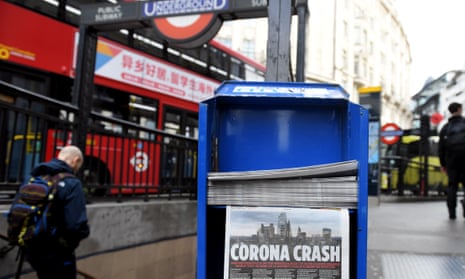National print newspaper sales have fallen by as much as 30% since the start of the government-ordered coronavirus lockdown, according to industry sources, with journalists at many local newspapers placed on leave and warnings that hundreds of reporters could be left without jobs as the advertising market collapses.
Thousands of independent newsagents have closed, commuter traffic is non-existent, and supermarkets are expected to cut the numbers of copies they take from next week because of reduced footfall. With many readers also self-isolating, one of the British news industry’s main sources of revenue has taken a heavy hit.
Organisations representing national newspapers have even had to promote guidance from the World Health Organization that newsprint does not pose a transmission risk.
Rasmus Kleis Nielsen, the director of the Reuters Institute at the University of Oxford, predicted “huge declines in advertising revenues” owing to the looming recession that is likely to result in hundreds or even thousands of job losses in British journalism. He predicted the economic effects of the pandemic could potentially remove 10% of all frontline journalistic jobs in the UK.
Some free local print news outlets have already stopped printing for the duration of the crisis, while regional titles that rely on advertising revenue from small businesses have been particularly badly hit.
Many sport reporters employed by the regional publisher Newsquest have been taken off work until the end of May and placed on the government’s job retention scheme, which will pay 80% of wages until the market improves. They have been joined by photographers and some news reporters, leaving depleted teams on reduced wages to produce local newspapers and websites.
Although the pandemic has attracted record-breaking audiences for online news sources, outlets have long struggled to earn substantial revenue from digital advertising. Some advertisers have also blocked their promotions from appearing along coronavirus-related stories, although there has been increased spending by the government on public health campaigns and by some major corporations such as banks.
Industry sources suggested sales of print outlets briefly rose in the run-up to the lockdown but have collapsed since people were asked to stay at home. One individual at a major national newspaper said the sales painted a “pretty bleak picture for us”, while a person at another title said the situation was “dire” but there had been “surges in home deliveries via independent newsagents”.
A spokesperson for the Guardian’s parent company said the crisis was having a “clearly negative impact on advertising revenues for all businesses, and the Guardian will be no exception”, acknowledging that print sales had been hit, but said more people were signing up to have the newspaper delivered.
They said traffic to the Guardian’s website was up more than 50%, exceeding all previous records, and there had been a substantial surge in the number of readers taking out digital subscriptions or signing up to make regular contributions to support its journalism.
Print revenue – both from the cover price paid by readers and print adverts – continues to provide the majority of revenue at most British newspapers, often in effect underwriting the cost of free online content. As a result almost all national newspapers are promoting offers that will ensure people can still get their print copies delivered directly to their homes, through sites such as DeliverMyNewspaper.
Free newspapers have been particularly badly hit by the collapse in commuters and ad revenue, with London’s Evening Standard adopting an improvised door-to-door delivery model, with a reduced circulation of just over 400,000 copies being posted through letterboxes in the centre of the capital.
Hyperlocal community news outlets have also issued a collective plea to the government for emergency funding and a share of public information advertising spending, in an effort to avoid collapse. Staff at the news agency PA Media have also been told that pay rises will be delayed and warned that open roles are unlikely to be filled.
Nielsen echoed the concern of many in the industry when he said a particular worry for British newspapers was that remaining print readers would lose the habit of reading a physical product during the lockdown.
“People are going to spend a lot of time online for the foreseeable future,” he said. “And so far, we have few examples of people returning to offline media once they have embraced online ones.”
